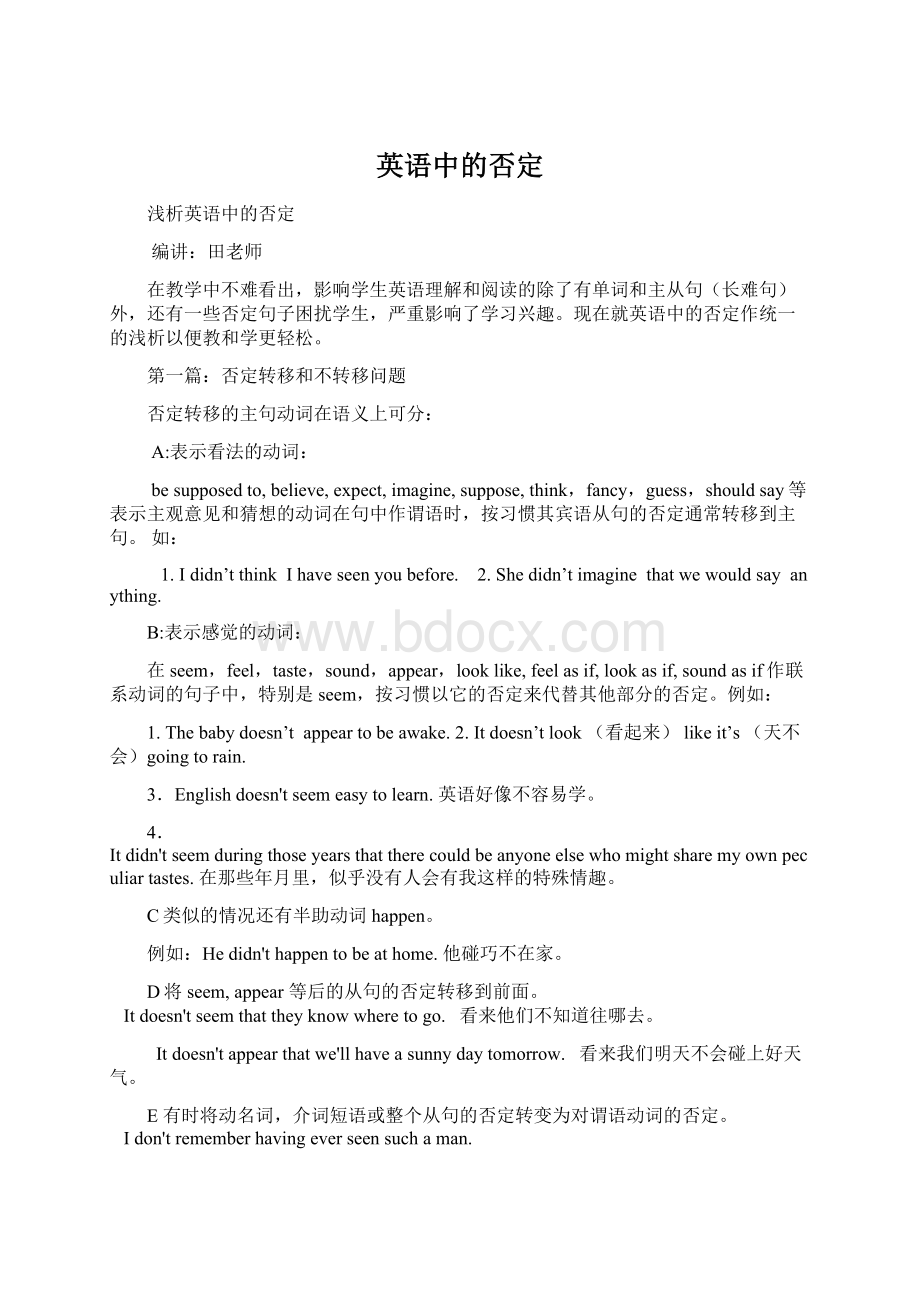英语中的否定.docx
《英语中的否定.docx》由会员分享,可在线阅读,更多相关《英语中的否定.docx(10页珍藏版)》请在冰豆网上搜索。

英语中的否定
浅析英语中的否定
编讲:
田老师
在教学中不难看出,影响学生英语理解和阅读的除了有单词和主从句(长难句)外,还有一些否定句子困扰学生,严重影响了学习兴趣。
现在就英语中的否定作统一的浅析以便教和学更轻松。
第一篇:
否定转移和不转移问题
否定转移的主句动词在语义上可分:
A:
表示看法的动词:
be supposed to, believe, expect, imagine, suppose, think,fancy,guess,should say等表示主观意见和猜想的动词在句中作谓语时,按习惯其宾语从句的否定通常转移到主句。
如:
1. I didn’t think I have seen you before. 2. She didn’t imagine that we would say anything.
B:
表示感觉的动词:
在seem,feel,taste,sound,appear,look like, feel as if, look as if, sound as if作联系动词的句子中,特别是seem,按习惯以它的否定来代替其他部分的否定。
例如:
1. The baby doesn’t appear to be awake. 2. It doesn’t look (看起来) like it’s (天不会)going to rain.
3.English doesn't seem easy to learn. 英语好像不容易学。
4.It didn't seem during those years that there could be anyone else who might share my own peculiar tastes. 在那些年月里,似乎没有人会有我这样的特殊情趣。
C类似的情况还有半助动词happen。
例如:
He didn't happen to be at home. 他碰巧不在家。
D将seem, appear 等后的从句的否定转移到前面。
It doesn't seem that they know where to go. 看来他们不知道往哪去。
It doesn't appear that we'll have a sunny day tomorrow. 看来我们明天不会碰上好天气。
E 有时将动名词,介词短语或整个从句的否定转变为对谓语动词的否定。
I don't remember having ever seen such a man.
我记得从未见过这样一个人。
(not否定动名词短语 having…) It's not a place where anyone would expect to see strange characters on the street.
在这里,人们不会想到在街上会碰上陌生的人。
(anyone 作主语时,从句中的谓语动词不能用否定形式。
)
F 状语和状语从句的否定转移
The ant is not gathering this for itself alone. (否定状语) 蚂蚁不只是为自己采食。
He was not ready to believe something just because Aristotle said so. (否定because状语) 他并不因亚里斯多德说过如何,就轻信此事。
She had not been married many weeks when that man's younger brother saw her and was struck by her beauty. (否定状语many weeks) 她结婚还不到几个月,这个人的弟弟就看见她了,并对她的美貌着迷。
G以because引导的从句或because of引导的介词短语在句中作原因状语时,其否定常常转移。
例如:
1.I don't teach because teaching is easy for me., and nor do I teach because I think I know answers, or I have knowledge I feel compelled to share with others. (= I teach not because… neither because…) 我当教师,并不是因为我觉得教书轻松……也不是因为我认为自己能够解答各种问题,或者因为我有满腹学问,觉得非与别人分享不可。
2.I didn't go there because of his request. (=I went there not because of his request.) 我不是因为他的要求而去的。
H 常见的句型
1.当think,believe,suppose,imagine这一类动词引导一个否定概念时,通常将引导动词think变为否定。
例如:
Idon’tthinkyou’vemetmywife. 你大概没有见过我的妻子吧。
2.结构句型“not…because…”中的not常常是否定because所引导的状语从句,而不是否定主句的谓语动词。
例如:
Theydidnotcometothehospitalbecausetheywantedtoseeme.
他们来医院不是因为要看我。
再如:
Tomwasnotunhappybecausehewasunabletogothere.
汤姆并不是因为不能去那儿而感到不高兴。
比较:
Hedidnotgotothelecturethismorningbecausehewassick.
今早他没来参加讲座,因为他病了。
Ididnotwritethatletterbecauseofwhatyoutoldme.
由于你给我说了,我才没有写那封信。
(或:
并不是因为你跟我说了,我才写那封信。
)
再如:
Youshouldnotlookdownuponamanbecauseheispoor.
误译:
因为一个人穷,所以你不应该看不起他。
正译:
你不应该因为一个人穷就看不起他。
在这个句子里,not否定的不是后面的动词lookdownupon,而是becauseheispoor。
值得注意的是,这种句型是有歧义的,我们要根据上下文排除歧义。
3.not…to
Theydon’tcometoseeyoulaughedat.
误译:
他们不是来看你被嘲笑的。
正译:
他们到这儿来并不是要看你被嘲笑的的。
在这个句子里,not否定的不是动词 come,而是toseeyoulaughedat。
更多的例子:
Hesaid,Now,look,Ididn’tcomeheretogetalongwithyouguys.You’regoingtohavetogetalongwithme.他说:
“喂,老弟们,我到这儿来不是来听你们的,该是你们来听我的。
”
二,只表示否定,但不转移
下列情况的却不用进行否定转移
1. 主句的谓语动词为一般过去时或过去完成时时。
例如:
He thought that it was not his duty to help Tom. 他认为帮助汤姆不是他的责任。
I had thought that he would not come.我原以为他不回来呢。
2. 主句的谓语动词为过去进行时时。
例如:
Mary was thinking the room was not hot enough.玛丽在想那房间还不够热。
We were thinking they could not receive our demands.我们在想他们不可能接受我们的要求。
3、主句的谓语动词为现在完成时或现在完成进行时时。
例如:
We have supposed we will not trouble you again.我们想我们不会再麻烦你了。
I have been thinking that the sky won’t fall down.我相信天不会塌下来。
4、当think用在疑问句中时,一般不要求否定转移。
Why do you think we can’t change your note?
你为什么认为我们换不开你的钞票呢?
Do you think my mother wouldnot permit this?
你认为我妈妈不会答应吗?
5、当主句中的谓语动词与情态动词连用时,不属于否定转移。
例如:
The boss must think I am not fit for the job.老板一定认为我不适合这项工作。
You can’t think how glad I am to see you. 你无法想象我见到你是多么高兴。
6、当主句中的谓语动词与状语连用时,不属于否定转移现象。
例如:
I didn’t think that they were happy. 我并不认为他们是幸福的。
I really think you needn’t worry about him.我真认为你没必要为他担心。
7、当主句中的谓语动词被加强语气的助动词do, does, did修饰时,否定不转移。
例如:
I do think it is wise of her to say so.我确实认为她这么说是明智的. I do believe she doesn’t tell a lie. 我真的相信她没有撒谎。
8、当宾语从句中有no, never, hardly等否定词时,否定通常不转移。
例如:
We all think that she is a person for nothing.我们都认为她是一个不中用的人。
I believe Tom never tells a lie.我相信汤姆从来不撒谎。
9、当宾语从句中含有not at all, not a bit, not…enough, can’t help doing等一些固定词组时,否定不转移。
例如:
I think she is not tired at all.我想她一点也不累。
I think I can’t help laughing if I see it.我想我看见它时会忍不住大笑。
第二篇,英语中的否定转化(否定形式,肯定意义)
一、转换否定
形式上否定而意义上则表肯定的句子。
1.cannot…too
Youcannotbetoocareful.
误译:
你不能太小心。
正译:
你越小心越好。
英语说的cannot…too,意为“就算再……也不过分”或“越……越好”,其中的can表示可能性,too有over之意,可以换用enough或sufficient等字样。
同时,在not的位置换用其他的否定词,如hardly,scarcely等也是可以的。
因此下面5句话的意思同上面这句话的意思是完全一样的。
Youcannotbeovercareful.
Youcannotbecarefulenough.
Youcannotbesufficientlycareful.
Youcannottakeenoughc